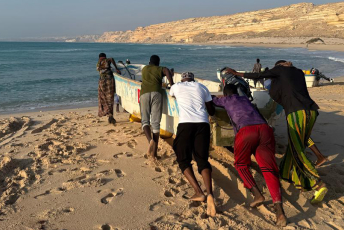Globally, over 1 000 park rangers have been killed over the last decade. A World Wildlife Fund report shows that in 2018, more than 100 wildlife rangers died on the job in Asia and Central Africa – nearly half were killed by poachers.
But hundreds more rangers’ deaths in developing countries go unreported and attacks on park rangers in the Congo Basin are on the increase.
The Congo Basin is home to the world’s second-largest rainforest after the Amazon. It spans six countries – Cameroon, the Central African Republic, Democratic Republic of the Congo (DRC), Republic of the Congo, Equatorial Guinea and Gabon – and has a biodiversity that includes 400 mammal species, 1 000 bird species and 700 fish species. It is also considered the last habitat of the endangered forest elephant, 60% of whose population has been lost to poachers in the past decade.
Dozens of national parks within the Congo Basin are home to a rich array of wildlife such as endangered bonobos, leopards, bongos, African golden cats, tree pangolins and African slender-snouted crocodiles. The ecosystems of these parks are being damaged as poachers are pushing some wildlife to the brink of extinction.
Park rangers in the Congo Basin play a critical role in protecting the natural heritage of the forests, the wildlife and natural resources. They patrol protected areas, keep track of available water in water bodies, manage fires, and search and care for animals in distress. They also help communities address human-wildlife conflicts, monitor wildlife populations and track and intercept illegal activities.
The rangers work tirelessly under challenging conditions and are faced with ongoing threats of death and injury from wild animals, poachers and villagers.
The global illicit economy in wildlife products is estimated to be worth more than $20 billion a year, ranked only behind drugs, weapons and human trafficking. Research suggests that $25 million is lost to African countries every year as a result of elephant poaching alone. Stemming the tide of this illicit economy puts African park rangers in the crossfire of poachers.
Local communities’ anti-park sentiments also put park guards at risk. There are conflicts about park boundaries, land appropriation and the regulation of the use of natural resources. This last factor restricts locals from using park areas for agricultural purposes. Armed groups, often closely linked to these communities through family and other social ties, mobilise these conflicts to garner support in areas where they operate and engage in poaching.
Since 2010 there’s been a rise in recorded attacks on park rangers in the Congo Basin, especially in Lobéké, Garamba, Kahuzi-Biega and Virunga national parks. According to research by the Armed Conflict Location & Event Data (ACLED) Project, recorded attacks against park rangers were sporadic a decade ago. However, in 2018 and 2019 six separate attacks on rangers were linked to poachers. That rose to eight in 2020. Five were recorded in 2021. The ACLED data relies on local groups and media reports, and many incidents of attacks on rangers probably go unrecorded.
Virunga National Park has become the hotspot of this trend. Over 100 of the park’s team of 700 rangers have been murdered in recent years. In 2014, unknown shooters wounded internationally renowned Belgian conservationist Emmanuel de Merode, the park’s director. In May 2018, the park was closed for eight months after a female park ranger was killed and two British tourists and their driver kidnapped. Twelve park rangers died in attacks by poachers in 2020 and another nine in 2021, including six eco-guards from the Congolese Institute for the Conservation of Nature.
The attackers include local terror groups such as the Mayi-Mayi militia, M23 rebels and unidentified armed groups, as well as insurgent groups with transnational reach in the Central Africa region and neighbouring states. These include the Lord’s Resistance Army, Democratic Forces for the Liberation of Rwanda and Islamic State West Africa Province.
Many of these armed groups have set up bases in and around Virunga National Park, and attack rangers with military-grade weapons. The illicit trafficking and trading of wildlife products (including elephant ivory, rhino horn, game meat, bones and skins), as well as other natural resources (such as minerals, timber and charcoal) finance and sustain the groups’ terror operations. According to a coalition of environmental and human rights organisations, armed groups earn hundreds of thousands of dollars each month this way.
An Agence Nationale des Parcs Nationaux du Gabon (ANPN) official, who spoke to ENACT on condition of anonymity, notes that terrorists from West, East and Central African countries are also invading Gabon’s forests, where they attack rangers and steal their weapons.
Prioritising the safety of park rangers is becoming increasingly necessary due to the rising number of attacks.
Policy solutions lie in adequately resourcing ranger squads and improving training. This training must evolve and adapt to the current demand and dynamics of the poaching war. Due to the extreme danger posed by poachers, it must incorporate new dimensions such as paramilitary drills. It should involve covert and aerial surveillance, crime scene management and community relationship building with local communities for intelligence gathering.
Considering the sophistication of the armed groups and poachers, states must also improve on the weapons available to rangers. Recently in Cameroon, the state deployed soldiers to help park rangers. This could be useful for other Congo Basin countries.
Lastly, forging a multinational joint task force among the Congo Basin countries – all of whom are members of the Central African Forests Commission – is a viable solution that must be explored.
‘We have to really collaborate to win this war,’ says the ANPN official. ‘Bilateral and multilateral cooperation is very important.’ With the Congo Basin being next to the Amazon Forest with respect to biodiversity endowment, the Congo Basin member states have a responsibility to protect the lives of those who guard its forests against external assailants, including terror groups and armed poachers.
Oluwole Ojewale, Regional Organised Crime Observatory Coordinator – Central Africa









